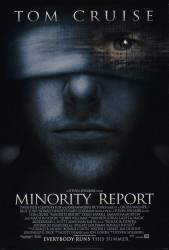Other mistake: Leo Crow grabs Anderton's gun and they each fight for control of it. Crow succeeds in forcing Anderton's hand to pull the trigger, killing Crow. The problem is, right after the gun is fired, we see a shot of Anderton with his arm fully extended and with his entire hand holding the entire gun, as if he had aimed and fired the gun himself. Such a sequence of events is at least totally illogical if not physically impossible. (01:44:10)

Other mistake: The name on the red ball at the beginning has the name 'Donald Dubin' on it. But in the end credits, it is spelled 'Donald Doobin'. (00:02:10 - 02:17:40)
Other mistake: When Anderton and the pre-cops are gearing up to prevent the Howard Marks murder, there is a shot of Anderton loading his gun. If you watch closely you can see he places a clip under the gun but doesn't actually put it in, he just sort of mimes inserting it. (00:08:55)
Other mistake: When Witwer is killed, he actually reacts to the impact on his head before the shot is heard. We are standing mere feet from the incident, so no 'speed of sound' delay applies. It's an obvious sound error during editing.
Other mistake: When Witwer tells Fletcher that Andertons already won and that Agatha is part of his future right after Anderton kidnaps Agatha. Fletcher should have already known that from the precious scene when Witwer told him that Agatha is the woman in the room with Anderton. (01:27:47)
Other mistake: At the beginning of the movie, we learn that the precogs "do not see what you intend to do, only what you will do" and that they cannot see suicides. At the end, Burgess intends to kill Anderton but does not go through with it; he commits suicide instead. Given these two facts, the precogs should not have seen Burgess' confrontation with Anderton at the end, and a red ball should not have been created.
Suggested correction: Burgess intention was in fact to kill Anderton, but the knowledge of the precogs predicting his murder attempt, the conflict inside his conscious, and the sound of the arriving helicopters made him change his mind at the last second, just like Anderton did in the apartment. The point is they have a choice, and having knowledge of that, only that, changes the future and makes it different from the visions.





